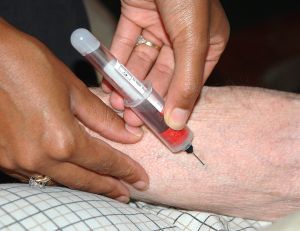Almost all folks, including attorneys who claim to specialize in OUI defense, believe that blood test results are dispositive of guilt. Almost all folks, including attorneys who claim to specialize in OUI defense, are wrong on that note. This article is not intended to disparage my colleagues. It is simply intended to emphasize your need to hire an OUI defense attorney who is equipped with the knowledge, experience and skill to represent you effectively and zealously.
During the course of any criminal case, the government is required to provide the defense with discovery (evidence). In blood test OUI cases, the government typically provides a notarized certificate, obtained from the DHHS lab that only shows the final result of the blood analysis: a number. If that number is 0.08 or higher, most folks, again including self-purported OUI “specialists” assume that the number is accurate and reliable and, therefore, dispositive of guilt. Once again, that assumption is unfounded and simply wrong.
I. Qualified Attorney
As in any OUI case, you should hire an attorney who is qualified to provide you with an effective and zealous defense. In blood test OUI cases, Maine has only a handful, if that, of attorneys who have the knowledge and experience to do so. Shop around and ask attorneys with whom you consult: What are your qualifications to represent me effectively? What do you plan to do about the blood test result?
I have spent two decades educating myself, with the invaluable assistance of expert witness chemists and toxicologists, about blood testing from blood inside the body to collection, storage and analysis of those samples for ethanol concentration.
My study of this topic culminated in March of 2013 when I attended the world’s top training school, more like a boot camp for OUI defense attorneys to learn about gas chromatography (the instrumentation and methodology used for the analysis of blood-alcohol concentrations among many other measurements). The class was taught by the world’s foremost chromatographer and recipient of America’s first PhD in gas chromatography, Dr. Harold McNair, and his protégé, Dr. Lee Polite at his lab in Chicago.
II. How to effectively attack a blood test result in three steps
The three steps are collection, storage and analysis. Errors occur in all three stages that can adversely affect the reliability of the result. Reliability is the ultimate issue.
 Collection has many subsets, many potential points of error that may render the result unreliable. Let us start with the sample itself before it is collected. Folks who have been involved in an accident are often taken to the hospital. If there is evidence of trauma, the person is almost always administered an IV which contains Ringer’s Lactate.
Collection has many subsets, many potential points of error that may render the result unreliable. Let us start with the sample itself before it is collected. Folks who have been involved in an accident are often taken to the hospital. If there is evidence of trauma, the person is almost always administered an IV which contains Ringer’s Lactate.
Ringer’s Lactate will be reported as ethanol by the instrumentation used by hospitals on a screening device (usually Abbott Labs TDX machine). That type of instrumentation is not forensically sound whether or not Ringer’s Lactate were introduced via IV. That type of “screening device” (meaning it is not designed to specifically identify ethanol as opposed to other chemicals) does not meet our own state regulations for reliability.
Folks involved in accidents are sometimes given blood transfusions. The only reporting requirement for blood donors is the presence of AIDS or HIV . There are no safeguards in place to ensure that the donor was ethanol free at the time of donation. It is not easy, but a skilled and experienced OUI defense attorney will know how to raise these issues of contamination of your blood sample and force the state to disprove them, a more difficult task indeed.
But there is more: The government must “lay a foundation” for the admissibility of blood test results including, but not limited to, that the person who drew the sample was statutorily authorized to so (in hospital settings, it often difficult for the government to even identify that person) and that the proper equipment was used to draw the sample. Let us pause here.
Maine state regulations specify the type of equipment that must be used to draw a blood sample for forensic (court case) use. The equipment must be a “DHHS approved blood kit”. Those kits, contain vacutainers (collection tubes) with grey stoppers or tops. In the phlebotomy industry, each color top indicates what each vacutainer is designed for in later analysis. You have probably noticed, when having blood work done, that the phlebotomist uses a series of different colored vacutainer tops to draw your blood according to the order sheet that he/she has received from your doctor. If the wrong vacutainer was used to draw your blood sample, the reliability of your test result has been fatally comprised.
Hospital vacutainers are often sent to the state lab for analysis. The government does not disclose this information on the certificate of the test result. Remember, the certificate only contains a number (which most folks including self-purported OUI attorney specialists assume are dispositive of guilt). Hospitals rarely, if ever, use grey top vacutainers. There is so much more to investigate including the fact that hospital blood samples are subjected to various sources of contamination (chemists inserting pipettes — big eye dropper devices– into blood samples to draw blood for various other types of analysis). Hospitals only test serum blood, not whole blood for ethanol, thus your result from a blood draw analysis will always be a false high, no matter what type of instrumentation is used to analyze it.
Unless you hire a qualified OUI attorney to handle your blood test case, you will never know if the foregoing defenses were available. Although this evidence is readily available, most defense attorneys do not request it either because they do not know what to request or they do not understand the importance of it to your case or both.
Next, let us turn to storage of samples. State regulations strictly require samples to be delivered to the DHHS lab within a certain amount of time and that they be stored at certain temperatures to avoid fermentation among other things. Even at the lab, storage must be strictly adhered to in terms of time and temperature. The lab maintains a temperature log of all refrigerated material. The lab must maintain calibrated/cal checked thermometers for its refrigeration apparatus.
Defense attorneys must explore storage issues: get the temperature logs from the lab; make sure the thermometer is properly certified/calibrated and that calibration checks are being done periodically (and passing such scrutiny). Again, defense attorneys must demand that this information be provided and then know what to do with it to help defend your case. Do not hire a lawyer who simply accepts the certificate with a number on it. Let us move on to step three: analysis of your blood sample.
The methodology, the instrumentation used to analyze or measure the ethanol concentration in a blood sample is called dual column gas chromatography. Those big words simply mean that the methodology (unlike breath test devices and the Abbott lab TDX device) and the instrumentation used are designed to specifically identify ethanol by 11separating” each specific molecule from others (the GC –gas chromatograph can even separate and identify ethanol—the alcohol we drink— from other types of alcohol like isopropanol —rubbing alcohol). Dual column gas chromatology is accepted by the Society of Forensic Toxicologists as of 2006 (reference SOFT Guidelines 2006, the Bible of forensic toxicology) as an acceptable method of measurement.
For a couple of years, Iadmittedly, assumed that the analysis prong of the reliability of blood test results was unassailable. Then I looked further. Then I demanded more discovery from the state lab and began working with private chemists and toxicologists. I found out that there is a tremendous amount of human error that occurs more frequently than one might think. GC analysis is only as reliable and accurate as the people who are using this instrument. If they mess up, the GC produces an unreliable result.
Your attorney not only needs to know how to obtain the relevant data from the state lab regarding your blood test analysis, your attorney must know how to interpret that data and, when necessary, work with a qualified expert witness in order to properly discharge his/her duty to provide you with the effective and zealous defense to which you are Constitutionally entitled.
For more information on the defense of blood test OUI defenses call us at 207-879- 4000.
Disclaimer: This article is intended to provide general, not specific, information about Maine law. The publication of this article does not constitute an attorney-client relationship between the author(s) and the reader(s).





